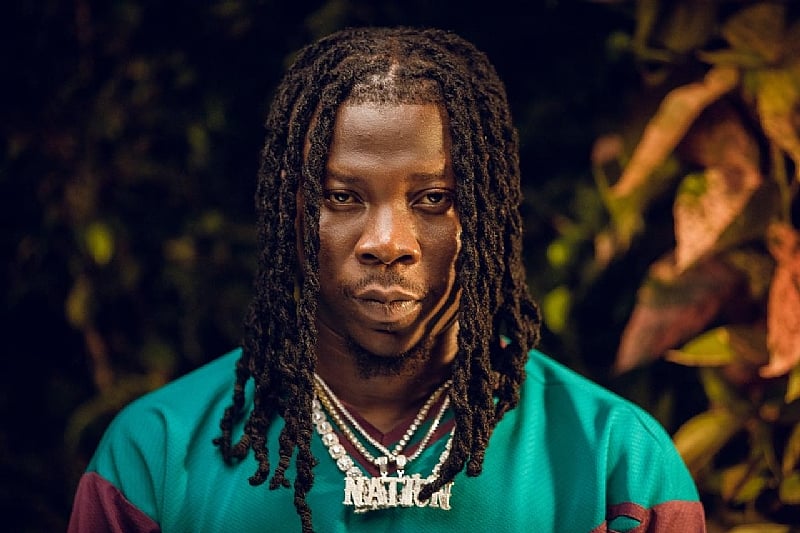Ghanaian superstar Stonebwoy has made a notable return with his sixth studio album, “Up & Runnin6,” which continues to showcase his signature “Afro-dancehall” sound. The album promises to propel the artist forward, but longtime fans might recognize familiar elements throughout the collection. While Stonebwoy delivers a suite of commercially appealing tracks that merge African pop melodies with reggae and dancehall influences, the question arises whether this latest effort reveals any artistic growth or simply retraces the path he has already traveled. The initial tracks make it evident that Stonebwoy remains committed to the formula that has underpinned his success, characterized by upbeat rhythms, catchy hooks, and a blend of languages that includes English, patois, and local dialects. Songs like “Your Body” and “Fvck Up Summer,” featuring Amaria BB, exemplify his knack for creating radio-friendly hits. However, this reliance on a proven structure also represents a shortcoming of the album; listeners might have expected deeper artistic exploration from an artist with six albums under his belt. Ultimately, “Up & Runnin6” focuses on celebratory themes of partying, love, and success, which, while entertaining, could leave some fans desiring more substantive innovation.
Despite the album’s overall predictability, it does contain moments of brilliance where Stonebwoy’s talent shines. A standout track is “Jejereje,” produced by Grammy-winning Ginton, which brilliantly melds traditional Ghanaian rhythms with modern production techniques. This fusion reflects the essence of Stonebwoy’s artistry and highlights his cultural heritage. Furthermore, “Betta Tin,” a collaboration with Nigerian artist Duncan Mighty, offers a compelling romantic narrative while maintaining a dancehall flair, showcasing the palpable chemistry between the two artists. These moments of cultural blending elevate the album and demonstrate Stonebwoy’s capacity for musical innovation. As he continues to explore these intersections between tradition and modernity, Stonebwoy reveals his unique identity within the broader African music landscape.
Additionally, Stonebwoy ventures into the growing amapiano genre with the track “Shine,” exemplifying his adaptability in an ever-evolving musical environment. While not groundbreaking, the move reflects his awareness of contemporary trends across Africa, contributing to his sustained success. Collaborations have always been a strong point for Stonebwoy, and “Up & Runnin6” is no exception. The reworked version of “Overlord,” featuring Larruso, Jahmiel, and 10Tik, presents a powerful ensemble track that captures the diverse spectrum of the dancehall scene. A particularly intriguing collaboration is “Pray For Me” with Wyclef Jean, where the pair delve into themes of struggle and perseverance. This exploration of more profound and introspective lyrics hints at the depth Stonebwoy can deliver when he steps beyond the boundaries of his established sound.
Commercial viability is evidently at the forefront of “Up & Runnin6,” with Stonebwoy strategically aiming to maintain his dominance in the African music scene. The album features nearly half of its tracks previously released in some form before the album’s drop, reflecting an approach that emphasizes consistent content and strategic single releases over traditional cohesive album experiences. While this tactic may disappoint fans who hope for rich, thematic projects, it is a well-justified strategy in the current music industry landscape, where immediate engagement on streaming platforms is paramount. Despite this focus on commercial success, the album is ultimately designed for maximum appeal, ensuring that it resonates on dance floors across various venues.
Sonically, “Up & Runnin6” is a polished production that merges elements from dancehall, afrobeats, and pop seamlessly. The crisp and modern sound enhances Stonebwoy’s confident vocals, which effectively oscillate between intricate verses and melodic choruses. Throughout the album, there’s a diverse sonic palette that keeps listeners engaged, while a coherent style ensures that all the tracks feel like part of a unified body of work. Yet, lyrically, the album does not break much new ground for Stonebwoy. The predominant themes revolve around familiar topics such as love, celebration, and self-affirmation. Although these are well-trodden themes in pop music, fans may crave a return to the social commentaries and personal reflections that Stonebwoy has previously delivered in his earlier works. Nevertheless, his lyrical dexterity and ability to switch between various languages and dialects add layers to the listening experience, allowing for both local and wider audience accessibility.
In contemplating Stonebwoy’s influence on the African music scene, it is essential to recognize his role in popularizing dancehall-influenced music within the Afrobeats movement. His proclamation on “Overlord” encapsulates his contributions: the artist has effectively crafted a distinct niche for himself, showcasing a blend of Jamaican dancehall aesthetics with African musical traditions. “Up & Runnin6” stands testament to this legacy, encapsulating an artist who has cultivated his style through six successful albums. In conclusion, while the album does not push artistic boundaries or introduce thematic depth indicative of groundbreaking work, it remains a well-executed collection of commercially viable tracks highlighting Stonebwoy’s Afro-dancehall mastery. For new listeners, it serves as an excellent entry point into his infectious sound, while longtime fans will undoubtedly find new hits to add to their playlists. Looking ahead, one wonders if Stonebwoy’s future projects might explore greater artistic ambitions, especially given the glimpses of potential seen in tracks like “Pray For Me.” Ultimately, Stonebwoy continues to excel within his established lane, and the principles that underpin “Up & Runnin6” ensure his ongoing success in the music industry.














